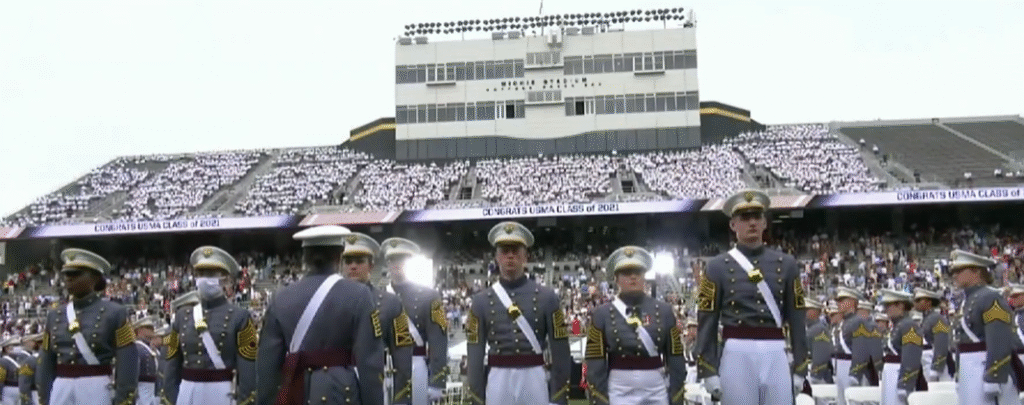Tim Bakken’s lawsuit against West Point is a serious challenge to how educational institutions strike a balance between authority and the search for the truth, and it goes beyond a simple personal disagreement with his employer. His accusations are especially startling because they come from an academic institution that is supposed to promote discipline and honor while also suppressing dissent in its classrooms. Commentators have said the paradox is remarkably effective in illustrating how institutions can try to project strength while undermining their own ideals.
The complaint focuses on regulations that were implemented in February 2025 in response to a presidential executive order that called for stricter regulation of service academies. In addition to requiring prior approval before publishing or speaking in public, these policies also prohibit professors from voicing their opinions during lectures and even go so far as to remove faculty books from libraries and websites. West Point is charged with methodically undermining the open inquiry tenets that ought to underpin higher education by effectively using administrative power.
The implications are particularly evident for Bakken. His capacity to evaluate and assess court rulings is essential to his teaching as a law professor, not an extravagance. The foundation of his profession is undermined when he is told he cannot discuss the validity of a majority opinion or the reasons why dissent is significant. He compares it to asking a painter to explain a piece of art without ever revealing the brushstrokes. He contends that these limitations have drastically lowered the standard of instruction cadets receive and created an atmosphere that subtly stifles critical thinking.
Table: Tim Bakken – Key Details
| Category | Information |
|---|---|
| Full Name | Tim Bakken |
| Profession | Law Professor, U.S. Military Academy at West Point |
| Position | Longest-serving civilian law professor at West Point (25+ years) |
| Specialty | Law and Philosophy, Academic Freedom, Constitutional Issues |
| Major Achievement | Established Department of Law at National Military Academy of Afghanistan (2007) |
| Books & Scholarship | Author of multiple books and essays critical of military policy |
| Legal Action | Filed lawsuit against West Point (Sept 2025) alleging First Amendment violations |
| Key Allegations | Faculty speech restrictions, censorship of scholarship, bans on classroom opinions |
| Reference | Forbes – Law Professor Files First Amendment Lawsuit Against West Point |

It’s also a very personal lawsuit. Under these regulations, Bakken fears academy leadership would prevent the publication of a book he has under contract that criticizes West Point. His fear is not unjustified; there have been many instances throughout history where strong institutions have silenced dissenting voices. The circumstances seem eerily reminiscent of previous scandals in sports, where individuals like Colin Kaepernick suffered severe consequences for speaking out, and Hollywood, where artists were blacklisted due to their political beliefs.
The breadth of this case is what makes it so novel. Bakken is requesting class action status on behalf of over 100 West Point civilian faculty members, claiming the limitations are part of a larger effort to regulate the academy’s intellectual life. If approved, this could significantly strengthen safeguards for instructors in all military schools. On the other hand, if the lawsuit is unsuccessful, the precedent might encourage other organizations to take similar actions, which could have far more rapid effects than expected.
Beyond the current legal dispute, the case speaks to a larger cultural discussion concerning free speech in the classroom. Disagreements over faculty comments, contentious curricula, and invited speakers have engulfed universities across the country. The limitations at West Point appear particularly symbolic in light of this ongoing conflict. There may be a significant and long-lasting chilling effect on civilian academia if even professors tasked with preparing future military leaders are unable to freely express their opinions.
West Point’s actions were accompanied by other politically charged actions, such as reviews of diversity and inclusion materials, according to observers. These measures follow a pattern of censorship that critics claim is remarkably resilient and unassailable, and they are similar to initiatives at the Naval Academy and other institutions to remove specific titles from libraries. Hence, the lawsuit draws attention to both the repression of faculty voices and the reduction of viewpoints accessible to cadets, who will eventually command soldiers in situations that call for cultural sensitivity and nuanced judgment.
The ramifications for society are enormous. The irony of silencing tenured professors in classrooms is unavoidable in a time when influencers on YouTube and TikTok can freely express their opinions. The lawsuit highlights a contemporary paradox: while free expression is thriving on unofficial platforms, it is noticeably restricted in formal educational institutions. As a cultural lens, that tension is immensely adaptable, explaining not only academic disputes but also corporate arguments over employee speech and celebrity conflicts over image management.
Bakken’s credibility is enhanced by his personal background. During the war in Afghanistan, he escorted soldiers to Kabul, taught at West Point for over 20 years, and even assisted in the founding of a law department overseas. These encounters highlight his dedication to service and the law. Like public figures who risk their reputations to bring uncomfortable truths to light, his willingness to question his own institution is presented as an act of principled courage.
There is still disagreement among the public about the lawsuit. Proponents contend that even in military academies, academic freedom must be vehemently protected because it is essential to higher education. Critics argue that the academy’s distinct purpose warrants stricter regulation, prioritizing order and discipline over dissension. This conflict is a reflection of broader social unrest in which institutions find it difficult to balance power and freedom. The lawsuit brings abstract discussions about free speech into sharp and inevitable focus, making that struggle incredibly evident.

